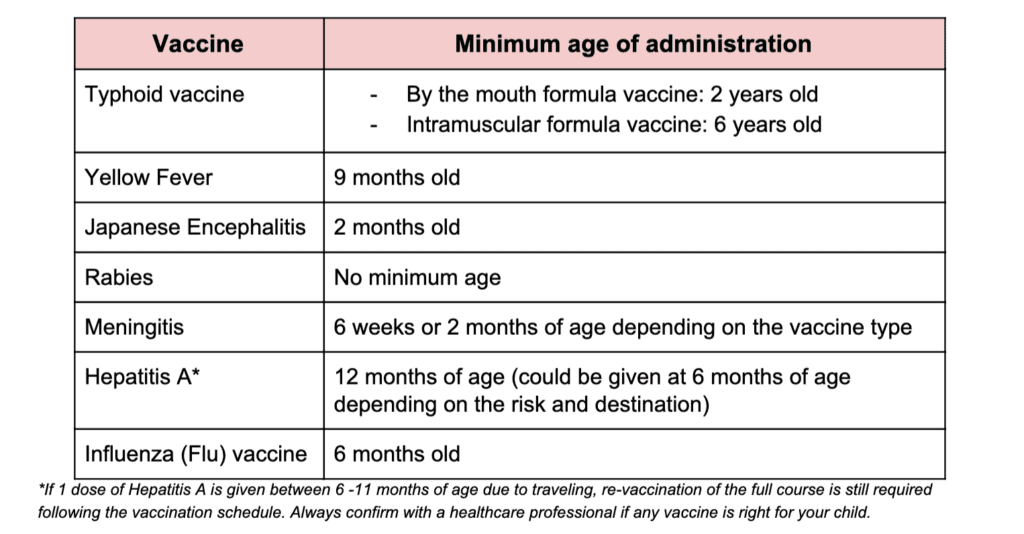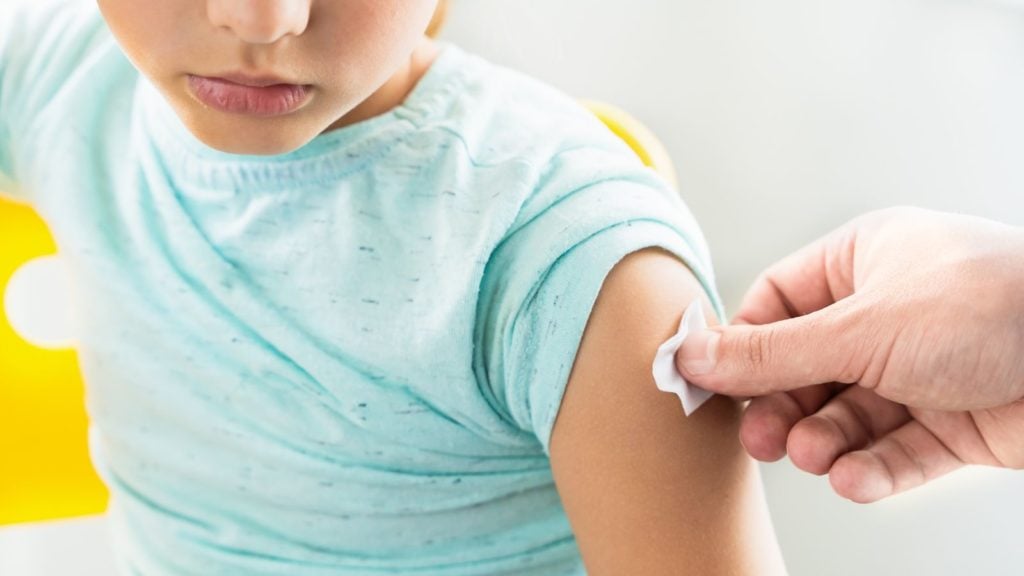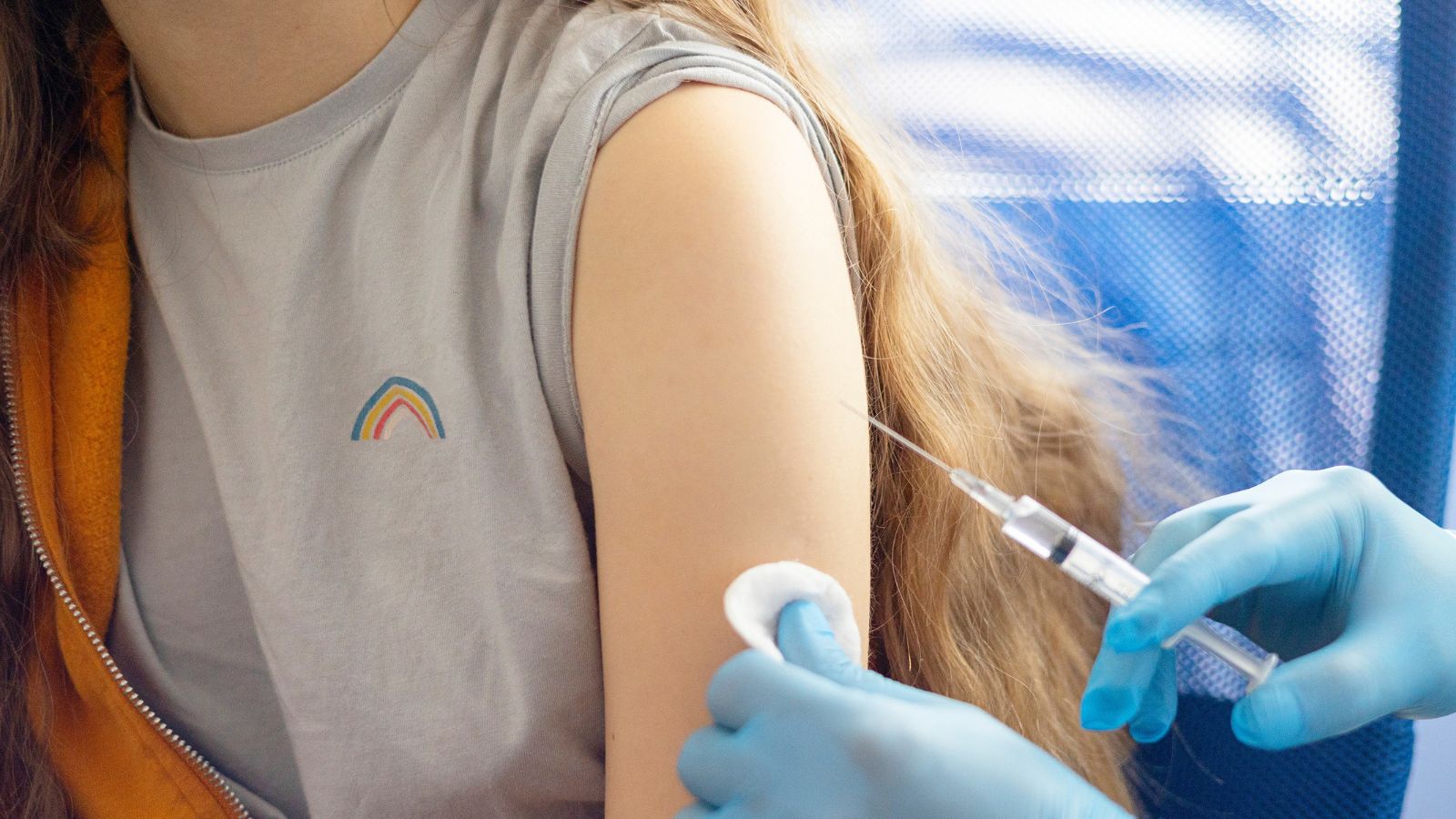Traveling with kids exposes us to new family travel adventures, but it can also expose our immune systems to unfamiliar diseases, ones not covered by routine vaccinations in our home countries. For this reason, travel vaccines are a vital part of preparation for international travel to certain countries or regions of the world.
What to Know about Travel Vaccinations
According to the U.S. Centers for Disease Control (CDC), close to 2.4 million children from the United States travel internationally every year. And when it comes to illness, kids face similar risks as adults—but depending on their age, kids may not have even completed their routine vaccine schedule yet. When you consider vaccines for international travel, different recommendations sometimes apply to children.
TRAVEL WITH KIDS: When Do You Need a Child Travel Consent Form?
Pre-travel immunizations at a travel clinic can protect you and your children while you’re traveling, keeping everyone safe and happy as you explore the world. Here’s everything you should know about required vaccinations for travel, including travel vaccinations for babies, older kids, and everyone else in your family.
Which Travel Vaccines Should My Child Get Before Traveling Internationally?
Recommended or required vaccines for travel depend on the destination. In some cases, recommended travel vaccines are based on the specific health risks.
Start by checking the CDC’s travel vaccination website to get a sense of which vaccines are recommended or required, and then follow up with a travel clinic visit or appointment with a travel medicine specialist. These specialists can provide tailored information based on the destination and vaccination schedule of your child, and can help you decide if optional vaccines for travel are right for your situation.
KNOW BEFORE YOU GO: How Early Should You Get to the Airport?
Recommendations and travel vaccination schedules vary depending on where you live (schedules vary among countries, states, and provinces), your child’s health, and the type of vaccine. A travel specialist can help you know if any additional travel vaccines are recommended. Here’s a list of travel related vaccines and minimum age of administration.

Do Some Routine Childhood Vaccines Require an Adjusted Schedule for Travel?
Before you go on any trip, your children should be up to date on their routine immunizations. In some cases, routine childhood vaccination schedules may need to be adjusted to provide extra protection for travel.
COVER THE BASES: Travel Insurance: The Ultimate Guide to What You Need
For example, often MMR (measles, mumps, and rubella) is given at the one-year-old visit. But in case of travel, your travel specialist may recommend giving a dose of MMR vaccine before the age of 12 months (minimum six months old). Note that in this case, you’ll still need to re-vaccinate the full course (two doses for MMR vaccine) after the age of one year old.
When Should Travel Vaccinations Be Assessed?
Once you’ve booked your travel, it’s a good idea to start assessing which vaccines you and your children should receive. You should schedule an appointment at your doctor’s office or at a travel vaccine clinic at least four to six weeks before you leave. The ideal time to receive required vaccinations for travel is usually at least a month before departure. This allows your body time to build the protective immunity before your trip.
PARENT’S GUIDE: Traveling with Food Allergies: How to Plan, Pack, and Enjoy Your Vacation
However, even if you’ve left it to the last minute, a pre-trip doctor’s appointment is still important. Immunizations can still be necessary, and pre-travel care extends beyond vaccinations. You and your child may still benefit from medicine to bring along in case of illness, and doctors are the best source of pre-travel medical advice beyond travel vaccines.
How Effective Are Travel Vaccines?
The effectiveness of vaccines varies. In general, most childhood vaccines provide more than 90 percent protection against diseases that are otherwise related to severe complications and death.
KIDS FLYING ALONE: What You Should Know Before Booking a Flight for an Unaccompanied Minor
Factors contributing to the effectiveness of vaccines include the recipient’s age, the recipient’s health status, the recipient’s immune response to the vaccine, and how well the vaccine components match the disease-causing bacteria/virus circulating in the population. In some cases, people who have only developed partial immunity to the vaccine may contract the disease. In this case, the vaccine helps reduce disease severity and prevent complications.
Are Travel Vaccines Safe for Kids?

All routine childhood vaccines and vaccines for international travel in babies and children that are currently available have been fully tested and approved for use by the U.S. Food and Drug Administration (FDA).
Vaccines stimulate the body to develop protective responses and make antibodies against a disease. As a result, you and your child can be protected against the disease when you’re exposed to the actual bacteria/virus in the future.
TRAVEL WHILE NURSING: Guide to Travel for Breastfeeding Moms
Rarely, vaccines may be contraindicated in some children, but the most common adverse effects of vaccines are minor and usually include fever and swelling or soreness at the injection site. Talk with a travel healthcare provider to know if a vaccine is right for your child, and about how to manage any adverse effect.
Does My Child Really Need a Vaccine Against a Disease That Is Now Rare?
Widely adopted vaccination schedules are effective and may help explain the scarcity of diseases such as varicella or measles in your home country. However, these diseases can still be prevalent in other parts of the world where such vaccination schedules are not in place.
TROPICAL VACATIONS: 5 Tips for Traveling to Mexico and the Caribbean During Hurricane Season
Traveling to such a country without immunization may expose your child to these preventable diseases. In addition, travelers can unknowingly bring back the disease-causing bacteria/virus. If the community is not protected by vaccines, these diseases can quickly spread again.
Will Giving Multiple Vaccines at the Same Time Overload a Baby’s Immune System?
The safety of giving multiple vaccines at once has been established by numerous studies. In fact, children are exposed to lots of foreign particles from the environment and their diets every day without adverse outcomes. Similarly, the amount of bacterial/viral particles in vaccines is not adequate to cause harm. Giving multiple vaccines at once ensures the child will acquire protection as early as possible, and prevents unnecessary delay in vital vaccinations.
GO LIKE A PRO: How to Avoid Long Airport Lines at Check-in, Security, Customs
Generally, there is no upper limit for the number of routine or travel vaccinations for babies that can be given at the same time. However, if live vaccines are to be given at separate times, each dose should be spaced out at least 28 days.
Tips for Preparing Your Family for Healthy Travels
Schedule your family’s appointment with a travel clinic or travel medicine specialist about four to six weeks prior to your departure date. Bring your and your children’s immunization records to every clinic visit so the health provider can sign and date each vaccination. And always bring your family’s immunization records with you when you travel.
Crystal Zhang and Gabrielle Asselin also contributed to this story.
More from FamilyVacationist:
- 10 Best Family Cruises and Ships in the World
- 7 Best Couples Cruises and Most Romantic Voyages
- How to Plan and Book Your First Cruise Vacation
Posted: June 2020
Updated: June 2022













